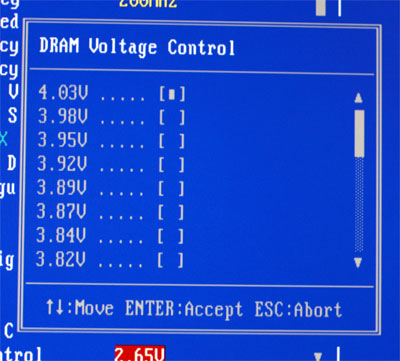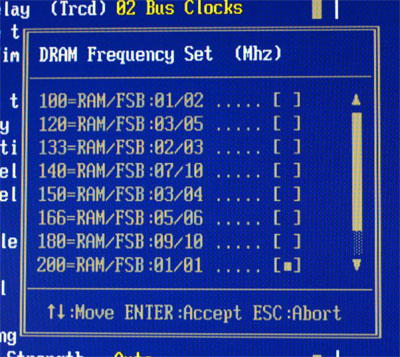DFI LANParty UT RDX200: ATI’s Crossfire AMD for the Bleeding Edge
by Wesley Fink on October 18, 2005 11:03 AM EST- Posted in
- Motherboards
Basic Features: DFI LANParty UT RDX200
The DFI nForce4 Ultra and SLI boards quickly developed a reputation for offering the enthusiast every imaginable BIOS option. The DFI RDX200 goes even further.
Oskar Wu, the Engineer behind DFI's legendary nForce4 series, is also the designer of this DFI RDX200. With so much already available in ATI's Reference design, Oskar concentrated on adding the "impossible" option of running 4DS DIMMs at 1T Command Rate and a working CAS 1.5 option in BIOS.
| DFI LANParty UT RDX200 | |
| CPU Interface | Socket 939 Athlon 64 |
| Chipset | ATI RD480 Northbridge - ATI SB450 Southbridge |
| Bus Speeds | 200 to 500MHz in 1MHz Increments |
| Memory Speeds | DDR200, 240, 266, 280, 300, 333, 360, 400 (433, 466, 500 with Rev. E AMD) |
| PCIe Speeds | Fixed |
| PCI/AGP | Fixed at 33/66 |
| Core Voltage | Auto, 0.8V to 1.55V in 0.025V increments PLUS 0.0V to 0.56V in 0.02V increments (Maximum vCore 2.11V) |
| CPU Clock Multiplier | 4x-25x in 0.5X increments |
| DRAM Voltage | Auto, 2.5V to 4.03V in .02V to .05V increments |
| HyperTransport Frequency | 1000MHz (1GHz) |
| HyperTransport Multiplier | Auto, 1X to 5X |
| HyperTransport (LDT) Voltage | 1.2V , 1/3V , 1.4V, 1.5V |
| Xpress 200 (NB) Voltage | 1.2V, 1/3V, 1.4V, 1.5V |
| NB Analog 1.2 Voltage | 1.2V, 1/3V, 1.4V, 1.5V |
| SB PCIe 1.8 Voltage | 1.8V, 1.9V |
| Memory Slots | Four 184-pin DDR DIMM Slots Dual-Channel Configuration Regular Unbuffered Memory to 4GB Total SUPPORTS 4 DS DIMMS AT 1T |
| Expansion Slots | 2 PCIe x16 1 PCIe x1 3 PCI Slots |
| Onboard SATA/RAID | 4 SATA Drives by SB450 (RAID 0, 1, JBOD) PLUS 4 SATA Drives by Sil 3114 |
| Onboard IDE/IDE RAID | Two Standard ATA133/100/66 (4 drives) |
| Onboard USB 2.0/IEEE-1394 | 8 USB 2.0 ports supported by SB450 2 1394 Firewire by VIA VT6307 |
| Onboard LAN | 2 Gigabit Ethernet PCIe Ethernet by Marvel 88E8053 PCI Ethernet by Marvel 88E8001 |
| Onboard Audio | Azalia HD Audio by Karajan Module with Realtek ALC882 Codec |
| BIOS Revision | Award (7/28/2005) |
The DFI nForce4 Ultra and SLI boards quickly developed a reputation for offering the enthusiast every imaginable BIOS option. The DFI RDX200 goes even further.


Oskar Wu, the Engineer behind DFI's legendary nForce4 series, is also the designer of this DFI RDX200. With so much already available in ATI's Reference design, Oskar concentrated on adding the "impossible" option of running 4DS DIMMs at 1T Command Rate and a working CAS 1.5 option in BIOS.










48 Comments
View All Comments
ozzimark - Tuesday, October 18, 2005 - link
it's very very very dependant on the cpu. notice that they used the FX-57 for those tests, which is a cpu that typically has some of the best memory controllers around.Wesley, how do 4xDS sticks perform with the 4000+?
Wesley Fink - Tuesday, October 18, 2005 - link
THe 4DSx1T worked fine on the 4000+. The key to this feature is the DRAM Drive Strength option in the BIOS. With older A64 drive strength needs to be set at 14 to 15. You can get things to work with a bit less DRAM Drive Strength with the newer controllers like those on the FX57.We mainly used the FX57 in the iT tests becuase it's fast, and the high stock test numbers made it easier to see the impact of the iT Command Rate on the various memory configurations.
ozzimark - Tuesday, October 18, 2005 - link
awesome, thanks Wesley. that's definitly a good thing to knowmongoosesRawesome - Tuesday, October 18, 2005 - link
depends on how high your memory will clock, and at what timings.LoneWolf15 - Tuesday, October 18, 2005 - link
I'm trying to make sure I understand this quote, Wesley...at the end, were you trying to say that you get little additional performance with the 7800GTX when compared to the 7800GT?
dornick - Tuesday, October 18, 2005 - link
He means you're wasting your money to buy a 7800gtx and play games at those settings when there are plenty of cheaper cards out there that do the job just as well.j@cko - Tuesday, October 18, 2005 - link
can i use nVidia SLI on ATi mobo?Wesley Fink - Tuesday, October 18, 2005 - link
Not yet. I have seen nVidia SLI running on the ATI Crossfire board but it required hacked video drivers. You will not see this option, or the reverse, until nVidia and ATI sanction this in their drivers.